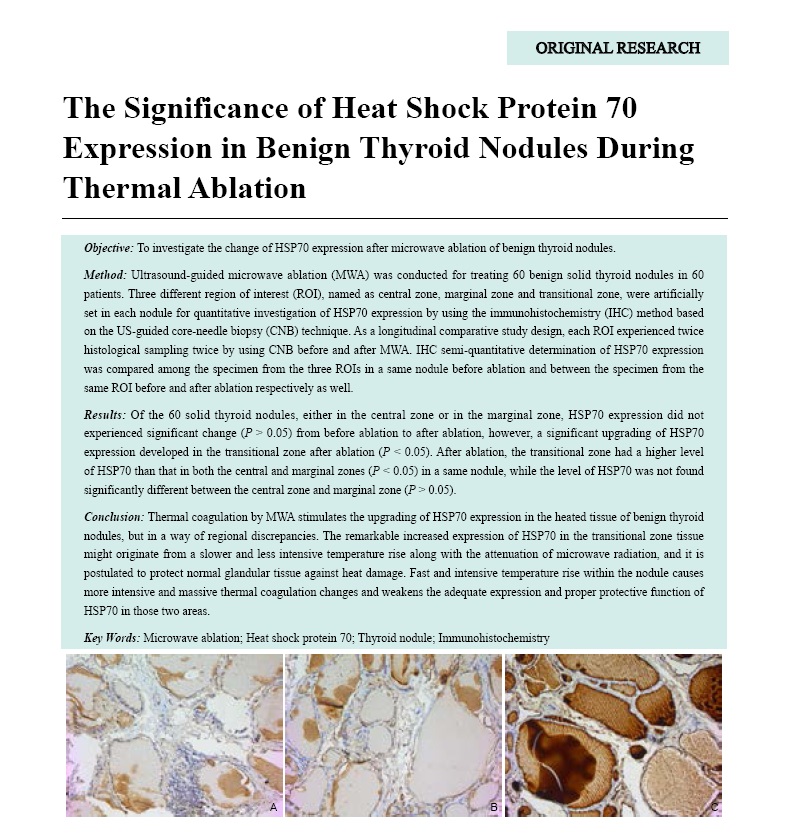

ADVANCED ULTRASOUND IN DIAGNOSIS AND THERAPY >
The Significance of Heat Shock Protein 70 Expression in Benign Thyroid Nodules During Thermal Ablation
Received date: 2019-03-29
Online published: 2019-09-05
Objective: To investigate the change of HSP70 expression after microwave ablation of benign thyroid nodules.
Method: Ultrasound-guided microwave ablation (MWA) was conducted for treating 60 benign solid thyroid nodules in 60 patients. Three different region of interest (ROI), named as central zone, marginal zone and transitional zone, were artificially set in each nodule for quantitative investigation of HSP70 expression by using the immunohistochemistry (IHC) method based on the US-guided core-needle biopsy (CNB) technique. As a longitudinal comparative study design, each ROI experienced twice histological sampling twice by using CNB before and after MWA. IHC semi-quantitative determination of HSP70 expression was compared among the specimen from the three ROIs in a same nodule before ablation and between the specimen from the same ROI before and after ablation respectively as well.
Results: Of the 60 solid thyroid nodules, either in the central zone or in the marginal zone, HSP70 expression did not experienced significant change (P > 0.05) from before ablation to after ablation, however, a significant upgrading of HSP70 expression developed in the transitional zone after ablation (P < 0.05). After ablation, the transitional zone had a higher level of HSP70 than that in both the central and marginal zones (P < 0.05) in a same nodule, while the level of HSP70 was not found significantly different between the central zone and marginal zone (P > 0.05).
Conclusion: Thermal coagulation by MWA stimulates the upgrading of HSP70 expression in the heated tissue of benign thyroid nodules, but in a way of regional discrepancies. The remarkable increased expression of HSP70 in the transitional zone tissue might originate from a slower and less intensive temperature rise along with the attenuation of microwave radiation, and it is postulated to protect normal glandular tissue against heat damage. Fast and intensive temperature rise within the nodule causes more intensive and massive thermal coagulation changes and weakens the adequate expression and proper protective function of HSP70 in those two areas.

Yan, MM Lei , Zhang, MD Jianquan , Sheng, MM Jianguo , Zhang, MM Hang , Diao, MM Zongping , Zheng, PhD Jianming . The Significance of Heat Shock Protein 70 Expression in Benign Thyroid Nodules During Thermal Ablation[J]. ADVANCED ULTRASOUND IN DIAGNOSIS AND THERAPY, 2019 , 3(3) : 103 -108 . DOI: 10.37015/AUDT.2019.190817
| [1] | Zhang JQ, Yan L, Diao ZP, Chen HQ, Cheng J.Potential threat of tracheal diverticulum to thermal ablation treatment of thyroid nodule. AUDT 2019;01:006-011. |
| [2] | Soudry E, Stern Shavit S, Hardy B, Morgenstern S, Hadar T, Feinmesser R.Heat shock proteins HSP90, HSP70 and GRP78 expression in medullary thyroid carcinoma. Ann Diagn Pathol 2017;26:52-56. |
| [3] | Zhang JQ, Diao ZP, Lu F, Sheng JG.Temperature gradient and elasticity gradient over the microwave-heated region in porcine liver in vitro. Chin J Ultrasonogr 2012;21:799-802. |
| [4] | Li M, Li Z, Gao Y, Tian J, Chen M, Dong J.Safety and efficacy of percutaneous radiofrequency ablation combined with percutaneous ethanol injection for hepatocellular carcinoma in high-risk locations. AUDT 2018;2:05-16. |
| [5] | Ahmed M, Kumar G, Gourevitch S, Levchenko T, Galun E, Torchilin V,et al.Radiofrequency ablation (RFA)-induced systemic tumor growth can be reduced by suppression of resultant heat shock proteins. Int J Hyperthermia 2018;34:934-942. |
| [6] | Rustagi T, Chhoda A.Endoscopic radiofrequency ablation of the pancreas. Dig Dis Sci 2017;62:843-50. |
| [7] | Ito T, Oura S, Nagamine S, Takahashi M, Yamamoto N, Yamamichi N,et al.Radiofrequency ablation of breast cancer: a retrospective study. Clin Breast Cancer 2018;18:e495-e500. |
| [8] | Zhang JQ, Ma Na, Xu B, Liu C, Song JL, Diao ZP.Methodology of percutaneous bi-polar radiofrequecy ablation of thyroid adenomas under ultrasound guidance and monitoring. Chin J Ultrasonogr 2010;19:861-865. |
| [8] | [In Chinese] |
| [9] | Liu C, Zhang JQ, Xiao L.Clinical application of ultrasound-guided percutaneous radiofrequency ablation for parathyroid adenoma. Acad J Sec Mil Med Univ 2013;34:371-4. |
| [9] | [In Chinese] |
| [10] | Zhang JQ, Lei Y, Chen HQ, Wu ZZ.Cyto-inactivation instantly induced by microwave ablation on thyroid nodules. Natl Med J China 2018;98:3524-7. |
| [10] | [In Chinese] |
| [11] | Zhang JQ, Qin ZF, Jiang JJ, Meng J.Percutaneous radiofrequency ablation combined with microwave coagulation therapy under contrast-enhanced ultrasound guidance for treatment of melanoma metastasis to lymph nodes:a case report . Acad J Sec Mil Med Univ,2006;27:1364-7. |
| [11] | [In Chinese] |
| [12] | Baek JH, Lee JH, Sung JY, Baek J, Kim K T, Sim J,et al.Complications encountered in the treatment of benign thyroid nodules with US-guided radiofrequency ablation: amulticenter study. Radiology 2012;262:335-42. |
| [13] | Wu J, Liu T, Rios Z, Mei Q, Lin X, Cao S.Heat Shock Proteins and Cancer. Trends Pharmacol Sci 2017;38:226-56. |
| [14] | Chen B, Feder ME, Kang L.Evolution of heat-shock protein expression underlying adaptive responses to environmental stress. Mol Ecol 2018;27:3040-54. |
| [15] | Zhang XH, Wu H, Tang S, Li QN, Xu J, Zhang M,et al.Apoptosis in response to heat stress is positively associated with heat-shock protein 90 expression in chicken myocardial cells. J Vet Sci 2017;18:129-40. |
| [16] | Chen T,CaoX. Stress formaintaining memory: HSP70 as amobile messenger for innate and adaptive immunity. Eur J Immunol, 2010; 40: 1541-44. |
| [17] | Dodd K, Nance S, Quezada M, Janke L, Morrison JB, Williams RT,et al.Tumor-derived inducible heat-shock protein 70 (HSP70) is an essential component of anti-tumor immunity. Oncogene 2015;34:1312-22. |
| [18] | Wang XP, Wang QX, Lin HP, Xu B, Zhao Q, Chen K. Recombinant heat shock protein 70 functional peptide and alpha-fetoprotein epitope peptide vaccine elicits specific anti-tumor immunity. Oncotarget 2016;7:71274-84. |
| [19] | Calderwood SK. Heat shock proteins and cancer: intracellular chaperones or extracellular signalling ligands?Philos Trans R Soc Lond B Biol Sci 2018;373(1738): 20160524. |
/
| 〈 |
|
〉 |